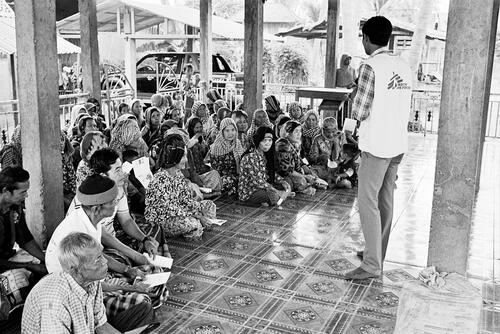“Cambodia has the second biggest prevalence of TB in the world with 800 people in every 100,000 infected with active TB,” said Jean Luc Lambert, Head of Mission in Cambodia for Médecins Sans Frontières.
Furthermore, approximately 60,000 people will be infected with the disease every year. “The problem is that the existing health system will only identify 25,000 to 30,000 people, so you can see the gap,” he said.
800 people out of 100,000 infected with active TB
Tuberculosis can develop very slowly and a person may not have any symptoms for a number of years. When the disease becomes active and a person develops symptoms, it may still take some time before they suspect TB or seek healthcare. Meanwhile, Jean Luc said, “you may contaminate your family and five, ten, twenty, or twenty-five people. That is why it is so important to develop this early detection and have more aggressive case finding activities,” he said.
To do that, Médecins Sans Frontières chose to target known high-risk groups such as those over the age of 55.
“We know that with the elderly the prevalence in Cambodia is three times higher than in the general population. So we developed a systematic screening for all the people over 55 to have early detection and prevent contamination,” Jean Luc said.
The process is easy enough but requires some particular logistics. Kim Federici is the Active Case Finding Project Manager in Tboung Khmum, a town 30 minutes outside of Médecins Sans Frontières’ main operations in Kampong Cham.
“We have two outreach workers who go into the community, and they explain what the activity is, they explain that it has no cost, they explain how it’s going to be carried out, how people will be transported and they answer questions,” Kim said.
Once at the hospital, the elderly villagers have a chest x-ray and then consult with a doctor. If the doctor suspects TB he requests a sputum sample. “It’s a very simple process – we can proceed through 100 people in four to five hours,” Kim said.
In the village of Kien Romiet, 76-year-old Thea Tolus waits for Médecins Sans Frontières’ follow-up nurse Hy Makara who is checking on TB patients identified through the Active Case Finding programme.
“MSF came to see the village chief and the village chief asked the people to go to see the MSF team about the screening,” Tolus said. “A MSF mini van came and took those who wanted to be screened to the hospital. When I arrived at the hospital the doctor saw me and after the process told me I had TB.”
“I did not know I had TB, but MSF knew it,” he said.
But while the response to the Active Case Finding has been significant in the villages, there have been other challenges.
Detection simple in rural villages, harder in urban areas
“The rural villages are simple but we have more difficulty in the urban areas because we need to take people away from their jobs to do the screening. That’s probably one of the biggest problems,” Kim Federici says.
So, in the spirit of Active Case Finding, Médecins Sans Frontières staff walk from stall to stall in the crowded Tboung Khmum market, looking for merchants who are over 55.
They use the opportunity to discuss TB, explain the Active Case Finding programme and hand out information about TB screening hoping to encourage anyone who hasn’t been screened to find time to do so.
But despite the challenges, the simple arithmetic with Active Case Finding speaks volumes for its potential.
“With the existing health system, where a person develops symptoms and goes to the hospital, we would have to screen 100 or 150 people to find one person with TB,” Jean Luc Lambert said. “With Active Case Finding we only need to screen 40 people to find one person with TB.”
Médecins Sans Frontières will now analyse the data to confirm the pilot programme’s success and cost-effectiveness.
“We will make summaries and findings to determine if it’s an effective tool,” Kim says. “I’d like to see Active Case Finding continue, especially in the rural population of Cambodia. I would like to see it expand into the other villages; I would like to see it grow into a common programme that is run for the elderly. To continue to do it through the populations that have not yet been screened would speak to minimising this disease immensely,” she says.




